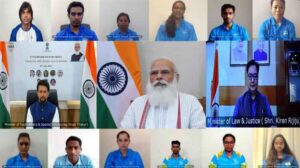The government of India has cleared the air on the ongoing WhatsApp row after Facebook-owned messaging app company moves court over the privacy rules. Union Minister of Telecom and IT Ravi Shankar Prasad has said that the govt is committed to ensuring the Right of Privacy to all its citizens but at the same time it is also the responsibility of the govt to maintain law and order and ensure national security.
The minister clarified that none of the measures proposed by India will impact the normal functioning of WhatsApp or the common users. He said, as per the established judicial dictum, no Fundamental Right, including the Right to Privacy, is absolute and it is subject to reasonable restrictions. The requirements in the Intermediary Guidelines pertaining to the first originator of information are an example of such a reasonable restriction.
‘Tracing originator of WhatsApp information last resort measure’
Ravi Shankar Prasad further explained that as per the Intermediary Guidelines, the originator of information can only be traced in a scenario where other remedies have proven to be ineffective, making the same a last resort measure. Moreover, such information can only be sought as per a process sanctioned by the law thereby incorporating sufficient legal safeguards.
Union Minister of Telecom clearly spelt out that such an order, to trace the first originator, under Rule 4(2) of the said guidelines shall be passed only for the purposes of prevention, investigation, punishment etc. in an offence relating to sovereignty, integrity and security of India, public order incitement to an offence relating to rape, sexually explicit material or child sexual abuse material punishable with imprisonment for not less than five years.
‘In public interest to find and punish the culprits’
He emphasised that it is in the public interest to find and punish the persons who initiate the mischief leading to crimes. He said, ‘we cannot deny how in cases of mob lynching and riots, etc. repeated WhatsApp messages are circulated and recirculated whose content is already in the public domain. Hence the role of who originated is very important.’
Ravi Shankar said that after October 2018, WhatsApp made no specific objection to the government in writing relating to the requirement to trace the first originator in relation to serious offences. They have generally sought time to extend the time for enforcement of guidelines but did not make any formal reference that traceability is not possible.
The minister expressed surprise at the last moment challenge in the court despite having sufficient time and opportunity during the consultation process and after the enactment of the rules. He said that any operations being run in India are subject to the law of the land. WhatsApp’s refusal to comply with the guidelines is a clear act of defiance of a measure whose intent can certainly not be doubted.
‘Indian rules not in isolation, have global precedence’
The Union Minister also informed that the rules enacted by the government are not in isolation but have global precedence.
In July 2019, the governments of the United Kingdom, United States, Australia, New Zealand, and Canada issued a communique, concluding that: “tech companies should include mechanisms in the design of their encrypted products and services whereby governments, acting with appropriate legal authority, can gain access to data in a readable and usable format.”
Brazilian law enforcement is looking for WhatsApp to provide suspects’ IP addresses, customer information, geo-location data and physical messages.’
The Telecom and IT minister also made it clear that what India is asking for is significantly much less than what some of the other countries have demanded.









50 jobs at risk of being replaced by ChatGPT
Just show your face and board the flight
New Maruti Baleno 2022: Features, specifications and more